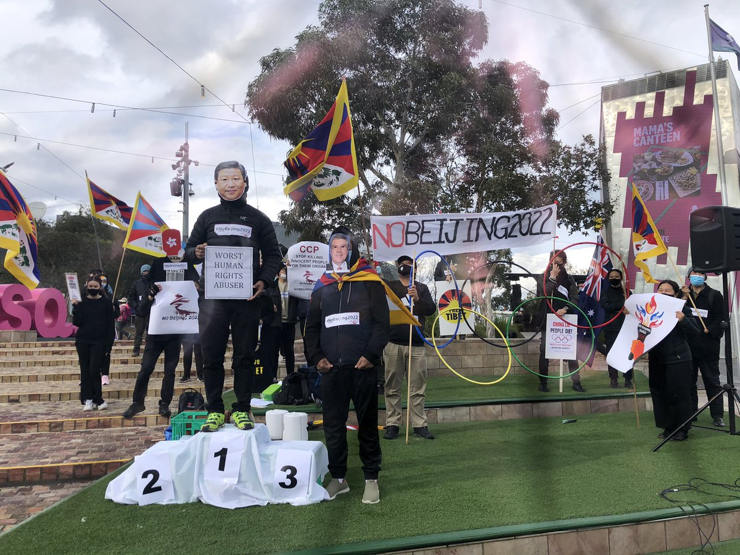

Campaigners from the No Beijing 2022 protest in Melbourne (Photo: NoBeijing2022.org)
<p>
As the Tokyo Olympic Games come to a close on Sunday, the focus shifts to the 2022 Winter Olympics, being hosted by Beijing in February. A worldwide call seeks to boycott the Winter Olympics over China&#39;s clampdown on human rights for its ethnic minorities.<br />
<br />
Some of the protestors have called for a diplomatic boycott of the Beijing Winter Olympics. This would mean that officials and diplomats refrain from attending the games while the sports persons attend it.<br />
<br />
<strong>Who is protesting?<br />
</strong>In June, a coalition of over 200 human rights organisations wrote to NBC Universal to cancel its broadcast deal for the Beijing games. A letter to the company said: &quot;We represent a coalition of 200 global campaign groups and are writing to you to urge NBCUniversal to cancel its broadcast deal for the Beijing 2022 Winter Olympic Games due to China&rsquo;s genocide against the Uyghur people, the severe and escalating repression in Tibet, Southern Mongolia, Hong Kong, and China proper, and geopolitical bullying of Taiwan&quot;.<br />
<br />
<a href="https://nobeijing2022.org/">The human rights organisations</a> are using the &quot;NoBeijing2022&quot; hashtag for their campaign mobilization and have appealed to governments to boycott the &quot;genocide games&quot;.<br />
<br />
But what is the overall mood? The US-based global watchdog Human Rights Watch (HRW) held an online conference on Friday to discuss the Beijing Games. &quot;Back in 2008, there was hope,&quot; Minky Worden, director of global initiatives at HRW said at the conference, <a href="https://asia.nikkei.com/Politics/International-relations/As-Tokyo-Games-end-boycott-debate-looms-over-Beijing-Olympics">according to <em>Nikkei Asia</em></a>.<br />
<br />
Comparing the first Beijing Games of 2008, Worden said that at that time there was a sense of optimism that the &quot;Olympics could bring positive change to the country, especially for press freedom and human rights. Instead, 13 years later, China is in the midst of its worst human rights crackdowns since the Tiananmen Square massacre in 1989&quot;, Worden said.<br />
<br />
HRW favours a diplomatic boycott of the Beijing games, not a complete one as it feels that these could be as problematic as the 1935 Berlin Games held in Nazi Germany.<br />
<br />
In the last week of July, a bipartisan group of <a href="https://www.reuters.com/lifestyle/sports/us-lawmakers-urge-ioc-delay-or-move-chinas-2022-winter-olympics-2021-07-23/">US Congressmen</a> appealed to the International Olympic committee (IOC) to postpone the Beijing Olympics and relocate the event.<br />
<br />
Democratic Senator Jeff Merkley and Representative Jim McGovern along with Republican Senator Marco Rubio and Representative Chris Smith wrote a letter to IOC President Thomas Bach saying: &quot;We have seen no evidence that the IOC has taken any steps to press the Chinese government to change its behavior&quot;.<br />
<br />
There have been similar calls from the British parliamentarians and European Union lawmakers.<br />
<br />
Though human rights organisations and concerned individuals have protested against China organising the games, governments have not reacted unfavourably as yet.<br />
<br />
<strong>Why the calls to boycott Beijing Olympics?<br />
</strong>Human rights campaigners feel that allowing China to hold the games will give legitimacy to Beijing and embolden it to further deprive its minorities of basic freedoms and human rights.<br />
<br />
Campaigners say that Beijing has tightened surveillance on ethnic minorities like the Tibetans, put more Muslim Ughyurs in concentration camps and has completely suspended international laws in Hong Kong.<br />
<br />
Apart from the violation of freedom rights, China, taking refuge behind the coronavirus pandemic, has attacked countries all around its borders to grab land. Under strongarm leader Xi Jinping, the PLA has transgressed into India, unilaterally changed the borders in Nepal and Bhutan and launched aggressive military manoeuvres against Taiwan and numerous nations in the South China Sea.<br />
<br />
<strong>What does China say?</strong><br />
China, which is overly sensitive to criticism, has reacted strongly over the boycott calls. In July, Weng Wenbin said: &quot;China firmly opposes the politicization of sports and the interference in other countries&rsquo; internal affairs by using human rights issues as a pretext&rdquo;. He added that any boycott will not succeed.<br />
<br />
While the human rights defenders want to force&nbsp;Beijing&nbsp;to open up its regions to inspections, China is looking at bigger glory by hosting the Olympics for the second time.</p>
External Affairs Minister S Jaishankar on Thursday met a delegation of special envoys from the…
Amnesty International has issued a report demanding the immediate and unconditional release of detained leaders…
India on Thursday dispatched a consignment of 300,000 doses of Measles and Rubella vaccines, along…
At least four people were killed and dozens injured in violent clashes between law enforcement…
An earthquake of magnitude 7.3 on the Richter Scale rattled Alaska in the early hours…
Amid rising global tensions and economic uncertainty, External Affairs Minister S Jaishankar on Wednesday raised…